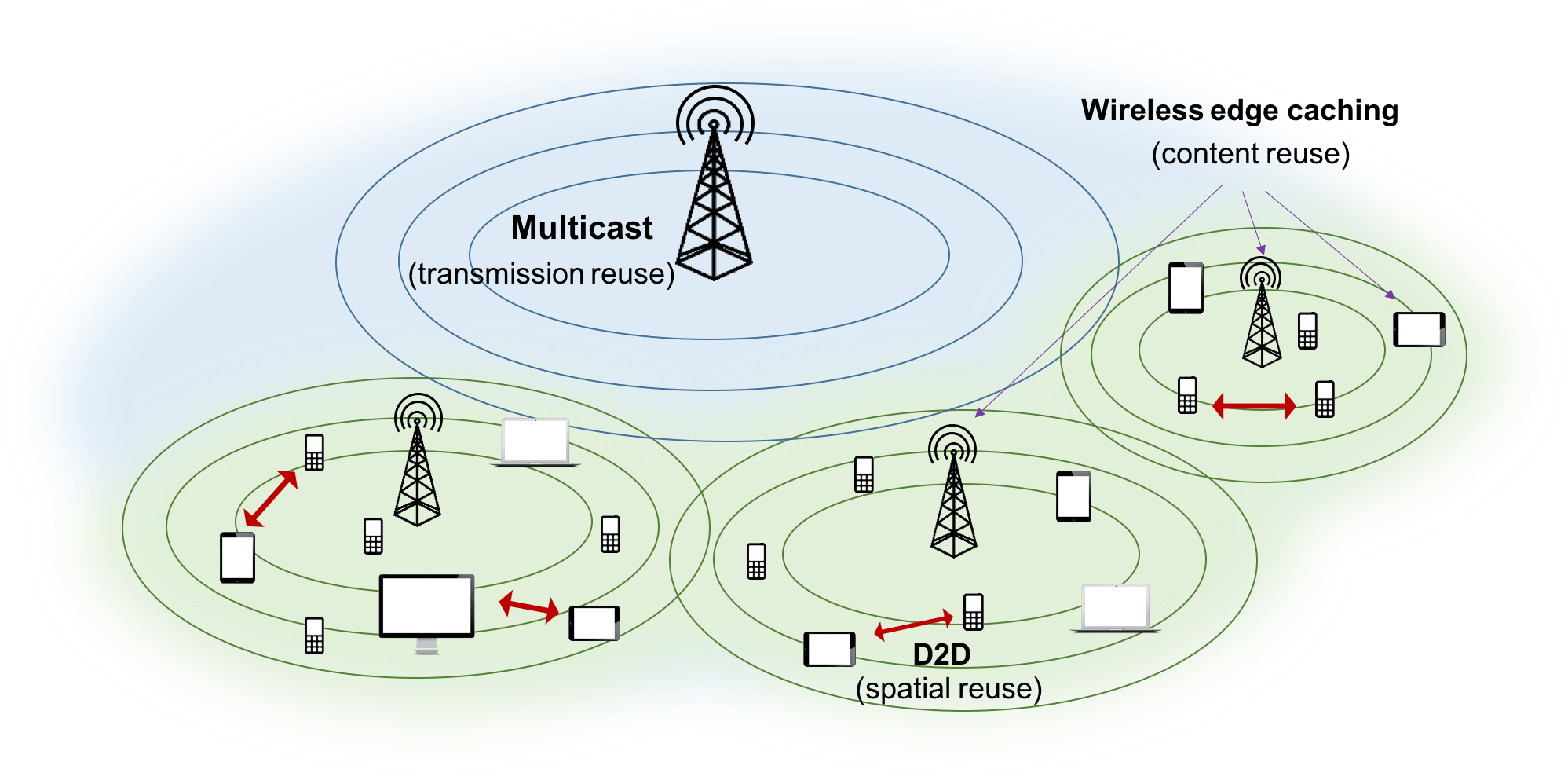The newest viral video could travel a network millions of times, thus creating a heavy traffic load. A solution to reducing network load is to prefetch popular content in local caches of network terminals (e.g. small-cell base stations, wireless access points, or end-user devices) and to store that data for future requests of a popular file. Caching information at the wireless network edge is particularly suitable for the delivery of video content which has a stringent delay and bandwidth requirements. Caching is facilitated by storage capacity becoming exceedingly cheap.
The simplest form of caching is to store the most popular files at every edge cache. With edge caching popular files can be locally delivered by edge devices, while other requests are directly served by the source (e.g. macro base station), thus achieving what is referred to as a local caching gain. However, replicating content on many devices can result in an inefficient use of the aggregate cache capacity.
Recent studies have shown that a global caching gain can be enabled in wireless networks by storing different content portions across several caches and capitalizing on the spatial reuse of device-to-device communications or exploiting globally cached information to multicast coded messages simultaneously useful to many users.
We study various aspects of caching on wireless networks:
– Distortion-memory trade-offs
We investigate the joint design of storage and transmission schemes for the efficient delivery of video-based services over next-generation heterogeneous wireless networks, by specifically considering the unique nature of video content and the wireless channel. We consider a scenario in which users store videos at different encoding rates (e.g. video layers in scalable video coding). The goal is to design caching and delivery schemes that, for a given broadcast rate, minimize the average squared error distortion experienced at user devices.
– Correlation-Aware Distributed Caching and Coded Delivery
State of the art caching schemes exploit exact content reuse across the network, which, due to the personalized nature of the content consumed by users, can lead to limited efficiency of the scheme. Distribution of correlated information across a network can lead to unnecessary transmission of redundant information. Paying attention to these redundancies can further help with the efficiency of content delivery to users. Exploiting content correlation becomes particularly critical as we move from static content distribution towards real-time delivery of rapidly changing and aging, but highly correlated, personalized data (as in news updates, social networks, remote sensing, augmented reality, etc.) in which exact content reuse is almost non-existent. We aim to understand how content correlations can be explored in order to improve the performance of cache-aided networks.
Featured Group Publications
- P. Hassanzadeh, A. Tulino, J. Llorca and E. Erkip, “Rate-memory trade-off for caching and delivery of correlated sources,” submitted to IEEE Transactions on Information Theory.
- P. Hassanzadeh, A. Tulino, J. Llorca, and E. Erkip, “On coding for cache-aAided delivery of dynamic correlated content,” IEEE Journal on Special Areas in Communications, vol. 36, no. 8, pp. 1666-1681, August 2018.
- Q. Yang, P. Hassanzadeh, D. Gündüz and E. Erkip, “Centralized caching and delivery of correlated contents over a Gaussian broadcast channel,” in Proceedings of IEEE International Symposium on Modeling and Optimization in Mobile, Ad Hoc, and Wireless Networks (WiOpt), May 2018.
- P. Hassanzadeh, A. Tulino, J. Llorca and E. Erkip, “Broadcast caching networks with two receivers and multiple correlated sources,” inProceedings of IEEE Asilomar Conference on Signals, Systems and Computers, November 2017.
- P. Hassanzadeh, A. Tulino, J. Llorca and E. Erkip, “Rate-memory trade-off for the two-user broadcast caching network with correlated sources,” in Proceedings of IEEE International Symposium on Information Theory, June 2017.
- P. Hassanzadeh, A. Tulino, J. Llorca and E. Erkip, “Correlation-aware distributed caching and coded delivery,” in Proceedings of IEEE Information Theory Workshop, September 2016.
- P. Hassanzadeh, A. Tulino, J. Llorca and E. Erkip, “Cache-aided coded multicast for correlated sources,” in Proceedings of IEEE 9th International Symposium on Turbo Codes and Iterative Information Processing, September 2016.
- P. Hassanzadeh, E. Erkip, J. Llorca and A. Tulino, “Distortion-memory tradeoffs in cache-aided wireless video delivery,” in Proceedings of Allerton Conference on Communication, Control, and Computing, October 2015.
